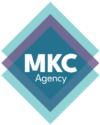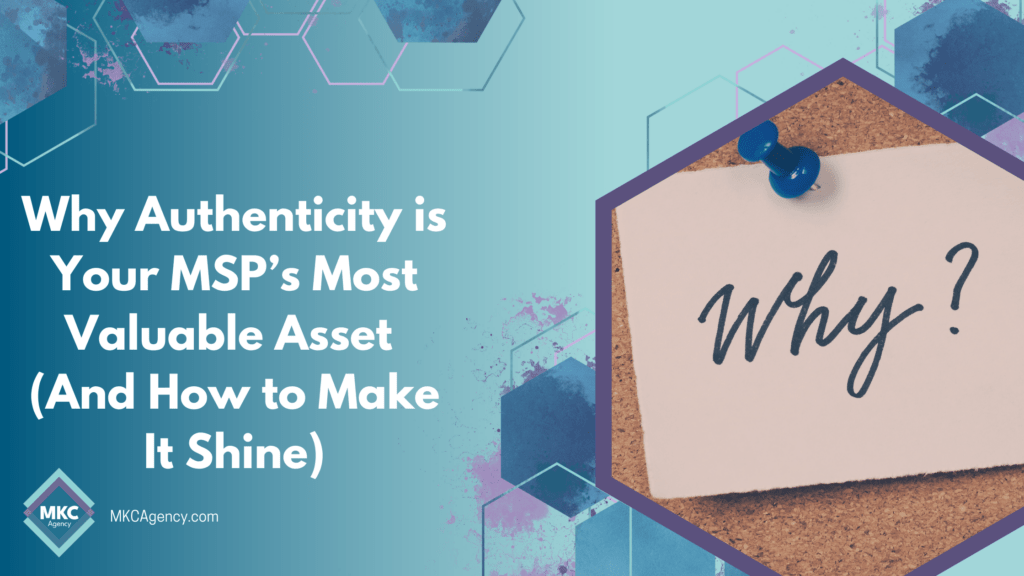Spoiler alert: If you’re chasing innovation as your Unique Value Proposition (UVP), you’re barking up the wrong tree.
Every MSP thinks they need the flashiest tools, the fastest speeds, and the newest tech to stand out. But guess what? Innovation alone isn’t going to be your golden ticket. Trust, relationships, and a solid UVP that speaks to who you are (not just what you do) will help you rise above the competition.
You want to cut through the noise? Let’s talk about why authenticity is the real MVP of your MSP’s UVP and how it’s the key to standing out in today’s crowded market.
The Innovation Trap: Why Being “The Fastest” or “Cheapest” Won’t Cut It
MSPs often assume that being the fastest or most affordable will help them stand out in a crowded market. Nadia Karatsoreos mentioned in her talk at Build IT 2024 that clients are no longer just looking for who has the shiniest tech—they want to know who they can trust to consistently solve their business challenges. She stressed that MSPs should focus on becoming trusted partners, not just service providers.
Research supports this idea; the truth is 96% of B2B buyers do their own research before contacting a company, and 71% prefer to research independently before they’re even ready to talk(HubSpot)(Qwilr – The modern way to sell). This means buyers decide based on the information they find—not on flashy tech buzzwords or overblown claims.
And let’s face it, being the fastest or cheapest doesn’t make you unique. In a city like Orlando with 137 MSPs, simply having a good toolset won’t differentiate you. Clients aren’t looking for the newest tech—they’re looking for someone they can trust.
The Real Differentiator: Trust Over Tech
So, what’s the real differentiator? It’s trust and authenticity. Millennials, who make up over 64% of B2B decision-makers, (Forrester) are prioritizing shared values and trust over technical features (Qwilr – The modern way to sell). Clients need to feel like you understand their business, not just that you can configure their systems.
According to HubSpot, 82% of sales professionals agree that building relationships is the most important part of selling. Your prospects aren’t just buying what you do—they’re buying why you do it. Authenticity becomes a competitive edge when your UVP communicates that you’re not just offering services but solutions grounded in trust and long-term partnerships.
Matthew Koenig said in his Build IT 2024 session, “Trust is your biggest differentiator. You can have all the tech in the world, but if clients don’t believe you’re aligned with their goals, they’ll go elsewhere.”
Clients want a partner who truly understands their business. Insight, one of the leading MSPs nationwide, has built a reputation around fostering long-term trust-based relationships with clients. Their UVP emphasizes the value of collaboration and transparency—they’re not just an IT provider but a business partner focused on driving client success
Business owners tend to care more about why than how, but often technical sellers end up dumping info about how we do what we do, rather than focusing on why it effects business outcomes.
Stop Talking Tech: Build a UVP That Speaks to Clients
Your UVP shouldn’t read like an instruction manual filled with technical specs—it needs to be about outcomes. Clients want to know how you will solve their problems, not just the tools you use. The key is to focus on client success stories and real-world results.
Clients want to hear about outcomes, not technical specs. Chris Benzinger highlighted while speaking about “Working Genius” that “Your UVP should speak to how you make your client’s life easier, not how impressive your tech is. Frame your value in terms of how you solve real problems.” Focusing your UVP on the client’s experience will make it more relatable and impactful.
Case Study: Huntress – Building Trust Through Transparency
When Cascade Technologies faced a severe remote access Trojan (RAT) attack, Huntress didn’t rely on overwhelming tech jargon. Instead, they focused on proactive communication and human-written incident reports to guide the client through every step of the resolution process (Huntress). By taking the time to explain each step and build trust, Huntress helped Cascade avoid further damage, showcasing how authentic, transparent communication builds lasting relationships.
Clients want clarity. They don’t want to be overwhelmed with tech jargon or acronyms. They need to know you’ll solve their problems, communicate clearly, and give them peace of mind.
Your UVP should focus on outcomes rather than tech features. Clients want to know how you’ll solve their problems, not just the tools you use. The key is to showcase real-world results through case studies.
Case Study: Ensono – Trust Through Transparent Partnerships
Ensono, one of the leading global MSPs, focuses on building transparent partnerships with their clients. By integrating seamlessly into their clients’ IT environments and offering continuous feedback loops, Ensono builds long-term trust. Their UVP highlights their ability to simplify IT management, which allows clients to focus on their core business. Transparency is key here—Ensono’s clients are always aware of what’s happening with their systems, building a deeper trust over time.
Authenticity in Action: How OITVoIP and Humanize IT Lead with Relationships
Case Study: OITVoIP’s Transparent Approach
OITVoIP sets itself apart with a client-first approach. By focusing on transparent pricing, proactive customer service, and communication, they’ve built trust with their client base. Their UVP isn’t about how many VoIP features they offer—it’s about ensuring client challenges are met with clear, consistent communication. This is how OITVoIP earns long-term loyalty
Case Study: Humanize IT—Making Tech Understandable
Humanize IT proves that tech doesn’t have to be intimidating. Their UVP focuses on simplifying IT for business owners, making tech understandable rather than overwhelming. By leading with authentic, straightforward communication, they foster strong client relationships that go beyond just providing IT support.
Real-World MSP Examples: Building Trust and Authenticity
Case Study: Expedient – Earning Loyalty Through Transparency
Expedient, another top MSP, has differentiated itself by focusing on transparent communication and proactive management. Their client-first approach ensures they’re more than just IT support; they actively partner with clients to manage risk, optimize operations, and deliver outcomes that drive business growth. By providing clear visibility into their processes, they create a seamless, trusted partnership with their clients.
Case Study: Insight – Building Relationships Beyond Tech
Insight differentiates itself by focusing on client success stories and offering holistic, tailored IT solutions. Their UVP emphasizes how their services align with the broader business goals of their clients, helping them achieve long-term growth through genuine partnerships, not just technical expertise. Insight’s commitment to transparency and collaboration makes them a trusted MSP partner for businesses across the globe(Simon-Kucher)
Building a UVP That Puts Authenticity First
Your UVP should emphasize more than just your technical capabilities. Here’s how to build a UVP that emphasizes authenticity:
Focus on Outcomes:
Instead of listing technical features, highlight client success stories that show how your services deliver tangible business outcomes. As mentioned by Koenig, clients care more about how you’ll impact their business. Use client success stories and results to highlight your UVP.
Speak Plainly:
Avoid tech jargon. Clients don’t want to be bogged down with acronyms—they want to know that you can solve their specific business challenges. Clients don’t need to understand every technical detail—they want to know how you’ll solve their problems. Karatsoreos stressed the importance of “keeping your message clear and simple” to ensure clients understand how you’ll deliver value.
Highlight Your Team:
Clients want to connect with the people behind the service. Show off your team’s expertise and commitment to building personal connections. Clients connect with real people, not companies. Show how your team’s unique approach builds lasting relationships. This was a key point made by Chris Benzinger in his session, where he emphasized the importance of personal connections in client retention.
Prove It:
Use testimonials, reviews, and case studies to back up your claims. 93% of buyers trust companies with positive reviews, so let your happy clients speak for you.
Innovate in Relationships, Not Just Tech
Technology alone won’t help you stand out as an MSP. Authenticity, transparency, and trust are the differentiators that will set you apart in a crowded market. Focus your UVP on building genuine partnerships with your clients, and you’ll not only attract new business—you’ll keep them for the long haul.
Chris Benzinger closed his Build IT session with a powerful statement: “Clients will always remember how you made them feel. If you make them feel like you’re a partner who cares, they’ll keep coming back.” Technology is important, but authenticity, transparency, and trust are the factors that will differentiate your MSP.
Clients don’t want to feel like they’re just another ticket in a service queue. They want a partner who’s genuinely invested in their success. By focusing on authenticity, trust, and relationship-building, you’ll not only attract new clients—you’ll retain them for the long term.
Want to learn more about building a UVP that works? Download our checklist to create a trust-based UVP and start standing out today!

